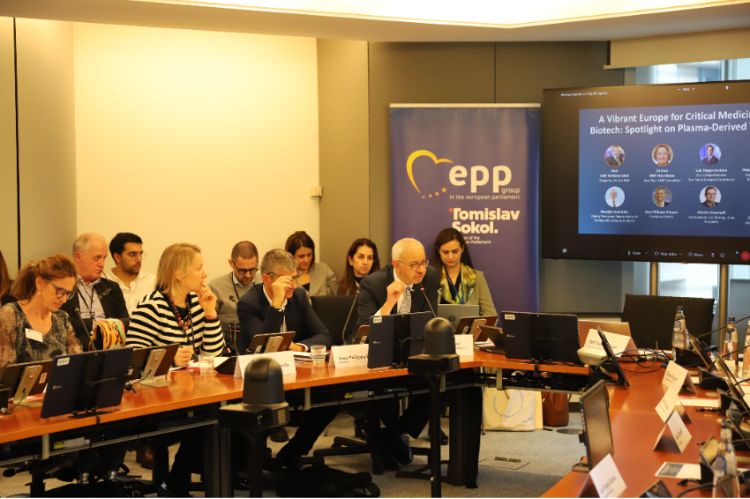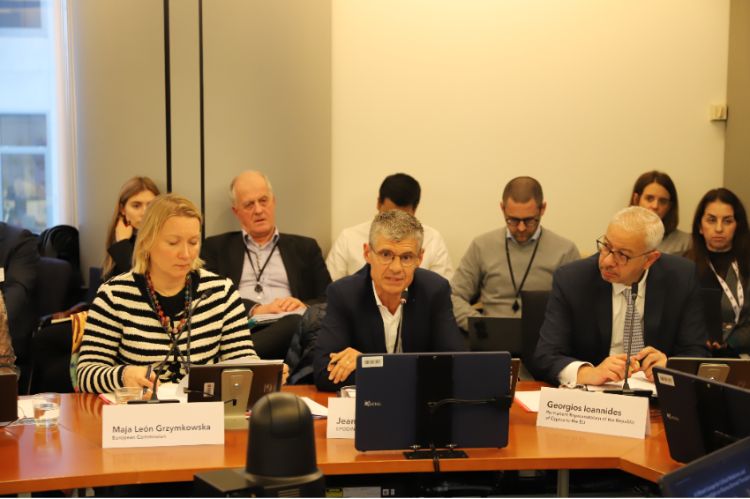Securing access to plasma-derived therapies: why the Critical Medicines Act must get it right
For thousands of Europeans living with rare and chronic conditions, plasma-derived therapies are not optional, they are lifesaving. These treatments, made from human plasma, are essential for patients with immune deficiencies, bleeding disorders, and other serious and rare conditions. They are also broadly used in emergency care and daily medicine. Yet, Europe faces a growing challenge: ensuring a stable, sustainable supply of these critical medicines.
The European Commission’s proposed CMA is a welcome step toward strengthening resilience in the pharmaceutical supply chain. But unless the CMA reflects the unique nature of plasma-derived therapies and unless it is coupled with strong, coordinated national industrial policies, it risks leaving vulnerable patients behind.
At a recent policy roundtable hosted by MEP Tomislav Sokol and co-hosted by MEP Stine Bosse, and in collaboration with the European Policy Centre and the Kangaroo Group, policymakers, patient representatives, and experts exchanged views on how the CMA can improve access to plasma-derived therapies, reinforce supply chain resilience, and strengthen Europe’s leadership in biotechnology.
 From right-to-left: Georgios Ioannides (Deputy Permanent Representative, Permanent Representation of Cyprus to the EU), Jean-Philippe Plançon (President of the European Patient Organization for Dysimmune and Inflammatory Neuropathies (EPODIN)), Maja León Grzymkowska, (Legal Officer, Unit for Medical products: quality, safety, innovation, DG SANTE, European Commission), Krista Bracke (patient advocate, Bubble ID)
From right-to-left: Georgios Ioannides (Deputy Permanent Representative, Permanent Representation of Cyprus to the EU), Jean-Philippe Plançon (President of the European Patient Organization for Dysimmune and Inflammatory Neuropathies (EPODIN)), Maja León Grzymkowska, (Legal Officer, Unit for Medical products: quality, safety, innovation, DG SANTE, European Commission), Krista Bracke (patient advocate, Bubble ID)
Why plasma therapies are different
Unlike chemical or biologic medicines, plasma-derived therapies cannot be manufactured synthetically. They depend entirely on human plasma donations. The journey between plasma donations to manufacturing end products requires time, infrastructure, and strict safety and quality processes. Europe currently collects only about 60% of the plasma that is needed to manufacture these treatments, relying heavily on imports to meet demand.
Any disruption, whether geopolitical, economic, or logistical, of an already sophisticated supply chain, can have life-threatening consequences for patients. This reality means that policies designed for traditional medicines cannot simply be copy-pasted for plasma therapies. The CMA must recognize these differences and adopt measures that reflect the complexity of plasma collection and fractionation, supporting and enhancing efforts driven by industry to this end.
“Immunoglobulin therapy often represents the only available treatment option for many patients. We worry that the CMA may fail to recognize the specificities of these therapies” (Jean-Philippe Plançon, President of the European Patient Organization for Dysimmune and Inflammatory Neuropathies, EPODIN).
Procurement: beyond price-only criteria
Public procurement rules often prioritize the lowest price. While cost efficiency matters, a price-only approach can undermine steady supply. “Member States should move away from price-only criteria in tenders, prioritize EU-based production, and award contracts based on supply security, including through multi-winner tender approaches.” (MEP Tomislav Sokol).
For plasma-derived therapies, sustainability and security of supply should weigh significantly in decisions to procure medicines. The CMA should encourage procurement frameworks that reward long-term supply reliability, quality, and resilience, not just short-term savings. “Health is not a cost, it's an investment. The health sector is strategic and essential to Europe's long-term resilience and competitiveness” (MEP Stine Bosse).
Stockpiling: proportionate, and supported by distribution agilities and increased EU plasma sourcing
Along with other measures earlier in the supply chain, stockpiling is a common strategy to prevent shortages, but for plasma-derived therapies, it is not a simple solution. These products are limited in volume, have limited shelf lives and require cold-chain logistics. Overly rigid stockpiling mandates could create waste without improving access or supply agility. Instead, the CMA should promote coordinated maximum, proportionate stockpiling – developed in consultation with industry. “Stockpiling must be coordinated, transparent, solidarity-driven and evidence-based” (Georgios Ioannides, Deputy Permanent Representative, Permanent Representation of Cyprus to the EU).
It is time for Europe to look at other smart approaches, like contingent centralized stocks of semi-finished products, white-labels and harmonized labelling and packaging – the earlier in the process the shortage prevention measures are applied, the more agility and speed they provide in the chain, as opposed to reallocating and repackaging products from one country to another. “We need to overcome barriers like labeling. Nationalistic approaches are hindering. While it’s not easy, we live in an era of digital solutions and digital tools can help ensure access. Uncoordinated stockpiling harms industry, consumers, and patients alike” (MEP Stine Bosse).

For these measures to meaningfully bring improvements, EU countries must increase the volume of plasma donations for manufacturing these treatments. “To reduce its dependency, the European Union must substantially enhance plasma collection capacity and move toward greater self-sufficiency. Meaningful progress can only be achieved through a strong partnership between the public sector and industry, always guided by the needs and interests of patients” (Jean-Philippe Plançon, EPODIN).
“Patients are increasingly concerned about the availability of plasma-derived therapies in light of recent geopolitical instability. The EU must take stronger action to boost plasma collection and manufacturing of plasma therapies to safeguard access to these essential treatments” (Krista Bracke, Patient Advocate, co-founder of Bubble ID, the organization for patients with Primary Immunodeficiency or PID).
Competitiveness: a strategic imperative
Ensuring the long-term competitiveness of the plasma sector is critical to maintaining a stable and resilient supply of plasma-derived therapies across Europe. National cost-containment measures such as mandatory payback mechanisms or regular price reductions, significantly hinder the sustainable economic viability of plasma therapies. The European Parliament draft report rightly called on Member States to reconsider cost-containment measures to safeguard the economic viability of critical medicines, such as plasma therapies.
“The Bioeconomy was identified in the Commission’s Competitiveness Compass as one of the new engines of economic growth and should benefit of a higher cooperation among the EU and Member States.” (Luis Viegas Cardoso, Competitiveness Task Force, European Commission)
Delivering the CMA’s objectives demands fast, coordinated action with Member States, particularly in areas where EU-level efforts alone may fall short.
“One of the measures of the CMA’s success will be stronger cooperation among Member States, especially as regards the industrial dimension of security of supply” (Maja León Grzymkowska, DG SANTE).
There is a sense of urgency for strategic alignment and more coordinated political efforts to secure long-term resilience and competitiveness in Europe’s critical medicines ecosystem.
The CMA Must Put Patients First
The CMA must ensure that patients remain at the center of every decision, from supply strategies to procurement design. As remarked by Jean-Philippe Plançon, EPODIN, “nothing about us, without us”, stressing the importance of considering the needs and perspectives of patients in every stage of the CMA.
A Call to Action
The CMA represents a once-in-a-generation opportunity to strengthen Europe’s health security. To make it truly effective for plasma-derived therapies and to make patient-focused decisions, EU policymakers should:
-
Recognize the unique nature of plasma-derived therapies and tailor supply resilience measures accordingly.
-
Reform procurement rules to prioritize security of supply and sustainability, not just price.
-
Adopt proportionate stockpiling strategies that balance preparedness with practicality, and couple them with reinforced initiatives to increase plasma collection.
-
Safeguard competitiveness by addressing cost-containment measures that hinder economic viability.
-
Ensure patients remain at the center of every decision, from supply strategies to procurement design.
By taking these steps, the EU can ensure that the CMA delivers on its promise: safeguarding access to critical medicines for all Europeans, including those whose lives depend on plasma-derived therapies.
Sign up to The Parliament's weekly newsletter
Every Friday our editorial team goes behind the headlines to offer insight and analysis on the key stories driving the EU agenda. Subscribe for free here.